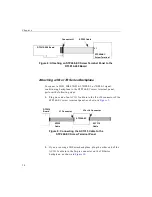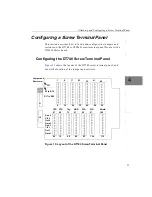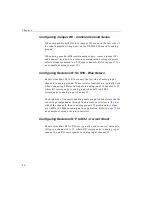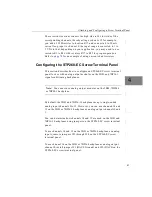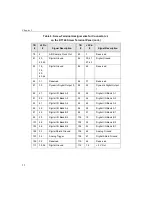
Wiring Signals
45
5
5
5
5
5
5
5
5
5
Preparing to Wire to a Screw Terminal
Panel
Wiring Recommendations
• Use individually shielded twisted-pair wire (size 14 to 26 AWG)
when using a DT3010 Series board in highly noisy electrical
environments.
• Separate power and signal lines by using physically different
wiring paths or conduits.
• To avoid noise, do not locate the screw terminal panel and
cabling next to sources that produce high electro-magnetic fields,
such as large electric motors, power lines, solenoids, and electric
arcs, unless the signals are enclosed in a mumetal shield.
• On the DT740 screw terminal panel, it is recommended that you
connect the shields as follows:
−
Connect the analog shield to screw terminals TB35 and TB36,
and to TB51 through TB56.
−
Connect the digital shield to screw terminals TB105 and
TB108.
−
Connect the analog and digital shields to one end only.
CAUTION:
To avoid electrical damage, ensure that power is turned off to the
computer and to any attached devices before wiring signals to the
DT740 screw terminal panel.
Summary of Contents for DT3010 Series
Page 1: ...R DT3010 Series UM 16868 C Getting Started Manual ...
Page 22: ...Chapter 2 12 ...
Page 36: ...Chapter 3 26 ...
Page 114: ...Chapter 5 104 ...
Page 136: ...Appendix A 126 ...
Page 142: ...Index 132 ...




